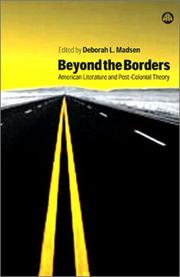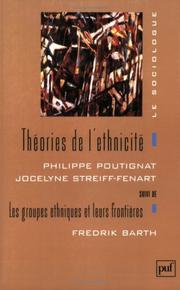| Listing 1 - 10 of 29 | << page >> |
Sort by
|

ISBN: 1559389230 9781559389235 Year: 1995 Publisher: Greenwich (Conn.): JAI Press,
Abstract | Keywords | Export | Availability | Bookmark
 Loading...
Loading...Choose an application
- Reference Manager
- EndNote
- RefWorks (Direct export to RefWorks)
Ethnie --- Conflit social --- Race --- Groupe ethnique --- Conflit --- Sciences sociales --- Race relations --- Ethnic conflict
Book
ISBN: 9232030462 Year: 1995 Publisher: Paris : Unesco,
Abstract | Keywords | Export | Availability | Bookmark
 Loading...
Loading...Choose an application
- Reference Manager
- EndNote
- RefWorks (Direct export to RefWorks)
Groupe éthnique --- Groupe minoritaire --- Conscience sociale --- Social consciousness --- Ethnic groups --- Minority groups --- Social change --- Coopération --- Cooperation --- Sustainable development --- Continuing education --- Cooperation.
Book
ISBN: 9782503588919 9782503588902 2503588913 2503588905 2503602282 9782503602288 9782503602295 2503602290 Year: 2020 Publisher: Turnhout: Brepols,
Abstract | Keywords | Export | Availability | Bookmark
 Loading...
Loading...Choose an application
- Reference Manager
- EndNote
- RefWorks (Direct export to RefWorks)
The three-volume project Cohesion in Multi-Ethnic Societies in Europe from c.1000 to the Present explores and seeks to find solutions to a crucial problem facing contemporary Europe: in what circumstances can different ethnic groups co-operate for the common good? They apparently did so in the past, combining to form political societies, medieval and early modern duchies, kingdoms, and empires. But did they maintain their ethnic traditions in this process? Did they pass on elements of their cultural memory when they were not in a dominant position in a given polity? The first volume of the project explored written sources about the past to show how communities shaped their collective memories in order to ensure the smooth functioning of multi-ethnic political communities. This second volume looks beyond texts and focuses on activities and events that were designed to build a sense of community within a political community made up of different ethnic groups. The coexistence of different ethnic groups is considered not through the prism of theoretical analyses by intellectual elites, but by following community members’ responses to current events as recorded in the sources.
E-books --- Multiculturalism --- Sociology [Urban ] --- Etnologie --- Europa --- Geschiedenis --- Bien commun --- Groupe ethnique --- Histoire --- Mémoire --- Ethnic groups --- Ethnicity --- Minorities --- History. --- Ethnic relations
Dissertation
Year: 2016 Publisher: Liège Université de Liège (ULiège)
Abstract | Keywords | Export | Availability | Bookmark
 Loading...
Loading...Choose an application
- Reference Manager
- EndNote
- RefWorks (Direct export to RefWorks)
Ce mémoire traite l'implication des plans européens pour l'inclusion sociale des rom en Roumanie. Particulièrement, l'intention de l'analyse est de comprendre pourquoi la mise en place des conditions européennes n'a pas contribué à la diminution du phénomène de discrimination ethnique des rom en Roumanie.La première partie englobe le cadre théorique de ce mémoire qui vise une clarification des différences conceptuelles entre les notions de groupe ethnique et de minorité ethnique car le statut social ambigu de cette population permet un certain positionnement à la limite explicative de deux concepts. Cette partie comprend aussi l'analyse de plusieurs acceptations du concept d’intégration des minorités et une remise en question de l'approche multiculturelle promue par l'UE. La deuxième partie est divisée dans deux sections : une analyse des documents principaux d'inclusion sociale pour les rom avec un accent particulier sur la question de la discrimination ethnique et une analyse du contexte socio-politique de l'émergence de la Stratégie Nationale pour l’inclusion des Rom , le document prioritaire pour l’implémentation des projets européens en Roumanie.Enfin,la troisième partie analyse l'impacte de l’implémentation du projet européen L’École,une chance pour chacun, au niveau des sous-groupes rom.Il s'agit, principalement,de l'impacte de la mise en œuvre du projet au niveau de deux écoles de la ville dont la structure ethnique comprend des élèves rom, ainsi que les conséquences de l'application de l'approche multiculturelle sur la perception de l'ethnicité des sous-groupes rom présents dans la ville.
inclusion sociale --- discrimination ethnique --- Union Européenne --- groupe ethnique --- minorité ethnique --- ségrégation ethnique --- éducation inclusive --- sous-groupes rom --- Droit, criminologie & sciences politiques > Sciences politiques, administration publique & relations internationales

ISBN: 0415095379 9780415095372 Year: 1997 Publisher: London Routledge
Abstract | Keywords | Export | Availability | Bookmark
 Loading...
Loading...Choose an application
- Reference Manager
- EndNote
- RefWorks (Direct export to RefWorks)
White people are not literally or symbolically white; nor are they uniquely virtuous and pure. Racial imagery and racial representation are central to the organisation of the contemporary world but, while there are many studies of images of black and Asian people, whiteness is an invisible racial position. At the level of racial representation, whites are not of a certain race. They are just the human race, a 'colour' against which other ethnicities are always examined. In White , Richard Dyer looks beyond the apparent unremarkability of whiteness and argues for the importance of analysing images of white people. Dyer traces the representation of whiteness by whites in Western visual culture, focusing on the mass media of photography, advertising, fine art, cinema and television. Dyer examines the representation of whiteness and the white body in the contexts of Christianity, 'race' and colonialism and, in a series of absorbing case studies, he discusses the representations of whiteness in muscle-man action cinema, from Italian 'peplum' movies to the Tarzan and Rambo series; shows the construction of whiteness in photography and cinema in the lighting of white and black faces, and analyses the representation of white women in end-of-empire fictions such as The Jewel in the Crown , and traces the disturbing association of whiteness with death, in vampire narratives and dystopian films such as Blade Runner and the Aliens trilogy.
Sociology of culture --- 82.091 --- #SBIB:309H504 --- Vergelijkende literatuurstudie --- Code en boodschap: sociologische, antropologische benadering --- Whites in popular culture. --- 82.091 Vergelijkende literatuurstudie --- Whites in popular culture --- Popular culture --- Blancs --- Médias et culture --- Groupe ethnique --- Dans l'art
Dissertation
Abstract | Keywords | Export | Availability | Bookmark
 Loading...
Loading...Choose an application
- Reference Manager
- EndNote
- RefWorks (Direct export to RefWorks)
Doelstelling: Enerzijds hebben wij getracht om de tweetalige (Frans-Nederlands) Gentse gemeenschap te benoemen aan de hand van de bestaande sociologische theorieën. We hebben ons hierbij toegespitst op de begrippen etniciteit, tweetaligheid en minderheid. Bovendien hebben wij de geschiedenis van de Gentse francofonie proberen te schetsen alsook de huidige situatie.Anderzijds hebben wij een kwalitatief onderzoek verricht bij 13 tweetalige Gentenaars. Via interviews hebben wij gepoogd na te gaan of de informanten zich identificeren met het begrip "etnische groep". We hebben onderzocht of de informanten kenmerken bezitten van een etnische groep. Ook de sociologische begrippen minderheid en elite kwamen in de interviews aan bod. Op die manier hebben wij getracht relevante informatie te verzamelen voor verder onderzoek naar de Gentse tweetaligen. Middelen of methode: Voor dit verkennend beschrijvend onderzoek hebben wij enerzijds een literatuurstudie verricht, anderzijds hebben wij een kwalitatief onderzoek uitgevoerd met behulp van de technieken van het interview. Resultaten: Uit de literatuurstudie is gebleken dat de literatuur over de Gentse francofonie beperkt is. Bovendien lijken de huidige sociologische perspectieven het geval van de tweetalige Gentenaars niet te kunnen vatten. Het kwalitatief onderzoek heeft aangetoond dat de informanten belangrijke kenmerken bezitten van een etnische groep. Daarnaast hebben wij de indruk dat de respondenten blijk geven van essentiële karakteristieken van een minderheid. Wij hopen dat deze scriptie kan bijdragen tot het verder uitbouwen van een theoretisch onderbouwd kader rond de Gentse francofonie.
L'ethnicité. --- L'identité ethnique. --- L'identité. --- La francophonie gantoise. --- Le bilinguisme gantois. --- Le bilinguisme. --- Les bilingues gantois. --- Maatschappij en instellingen. --- Un groupe ethnique. --- Une minorité linguistique. --- Une minorité.

ISBN: 9780745320458 Year: 2003 Publisher: London : Pluto Press,
Abstract | Keywords | Export | Availability | Bookmark
 Loading...
Loading...Choose an application
- Reference Manager
- EndNote
- RefWorks (Direct export to RefWorks)
The contributors to this book challenge the usual boundaries of "post-colonial" theory. Focusing on American literature, they examine how America's own imperial history has shaped the literatures that have emerged from within America - for instance, from Native American, Latino, Black and Asian-American writers. They contrast this with postcolonial literatures from countries whose history has been shaped by American colonialism - from Canada, Central America and the Caribbean to Hawaii, Indonesia and Vietnam. In this way the contributors explore key questions about national identity and multiculturalism: why, for instance, is a Native writer categorized within "American literature" if writing on one side of the border, but as "Canadian" and "post-colonial" if writing on the other? This is a challenging collection that raises questions not only about the boundaries of post-colonial theory, but also about ethnicity and multiculturalism, and the impact of immigration and assimilation - issues that lie at the heart of the literary curriculum.
Littérature américaine --- Littérature américaine --- Pluralisme (sciences sociales) --- Pluralisme (sciences sociales) --- Groupe ethnique --- Ethnicité --- Auteurs appartenant à des minorités --- Histoire et critique --- Etats-Unis --- Dans la littérature --- Dans la littérature --- Dans la littérature --- Littérature américaine --- Littérature américaine --- Pluralisme (sciences sociales) --- Pluralisme (sciences sociales) --- Groupe ethnique --- Ethnicité --- Auteurs appartenant à des minorités --- Histoire et critique --- Histoire et critique --- Théorie, etc. --- Etats-Unis --- Dans la littérature --- Dans la littérature --- Dans la littérature
Book
ISBN: 0820309532 Year: 1987 Publisher: Athens, GA : University of Georgia Press,
Abstract | Keywords | Export | Availability | Bookmark
 Loading...
Loading...Choose an application
- Reference Manager
- EndNote
- RefWorks (Direct export to RefWorks)
Canon (Literature) --- Canon (Literatuur) --- Canons littéraires --- Literaire canon --- American poetry --- 20th century --- History and criticism --- Minority authors --- Poésie américaine --- POESIE AMERICAINE --- MINORITÉS --- GROUPE ETHNIQUE DANS LA LITTERATURE --- ETHNICITE DANS LA LITTERATURE --- 20e siècle --- Histoire et critique --- AUTEURS APPARTENANT A DES MINORITES --- ETATS-UNIS --- VIE INTELLECTUELLE

ISBN: 2130466273 9782130466277 Year: 1995 Volume: *4 Publisher: Paris : PUF - Presses Universitaires de France,
Abstract | Keywords | Export | Availability | Bookmark
 Loading...
Loading...Choose an application
- Reference Manager
- EndNote
- RefWorks (Direct export to RefWorks)
Le terme "ethnique" s'applique à des réalités hétérogènes. Il crée un malaise théorique que vient encore aggraver sa proximité avec la notion de race. A travers la présentation critique de nombreux auteurs, cet ouvrage montre comment une problématique sociologique de l'ethnicité a pu se constituer par déplacement d'une conception fixiste vers une conception flexible du groupe ethnique.
Caractères culturels --- Caractères ethniques --- Ethnic identity --- Ethnicity --- Ethnicité --- Ethnisch bewustzijn --- Groepsbewustzijn [Etnisch ] --- Group identity [Ethnic ] --- Groupes ethniques -- Identité --- Identité culturelle --- Identité ethnique --- Identité raciale --- Identités ethniques --- Tribalisme --- --Ethnicité --- Groupes ethniques --- 572.9 --- Special anthropography. Ethnology. Individual races --- 572.9 Special anthropography. Ethnology. Individual races --- Differenciation sociale --- Groupe ethnique --- Relations interethniques
Book

ISBN: 2738012183 2876146231 291581905X 9782876146235 9782915819052 9782738012180 Year: 2005 Publisher: Paris : Cirad : Iddri : IFB : INRA,
Abstract | Keywords | Export | Availability | Bookmark
 Loading...
Loading...Choose an application
- Reference Manager
- EndNote
- RefWorks (Direct export to RefWorks)
Biodiversité --- Biodiversity --- Ressource génétique --- genetic resources --- Patrimoine culturel --- Cultural heritage --- Groupe éthnique --- Ethnic groups --- Conservation des ressources --- Resource conservation --- Gestion des ressources --- resource management --- Politique sociale --- Social policies --- Politique de l'environnement --- Environmental policies --- Politique de développement --- Development policies --- France --- Conservation des ressources naturelles --- Ethnosciences --- Biodiversité - France --- Conservation des ressources naturelles - France --- Ethnosciences - France --- Ethnologie --- Conservation of natural resources --- Ethnoscience
| Listing 1 - 10 of 29 | << page >> |
Sort by
|

 Search
Search Feedback
Feedback About UniCat
About UniCat  Help
Help News
News